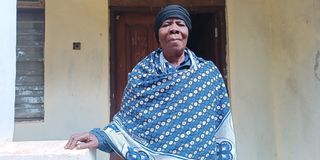Meet Makonde woman who educated 7 siblings with Ksh6 pay

Lydia Boma at her home in Mtwara, Tanzania on June 8, 2023. This Makonde woman educated her seven siblings with Ksh5.79.
What you need to know:
- Lydia Boma was once considered among the most educated women in Mtwara Tanzania.
- Her father did not support girlchild education but through her mother's support, she went through school.
In 1957, Lydia Boma finished Class Eight at a missionary school in Newala town in Tanzania’s Mtwara region.
At the time with her level of education, Lydia was considered one of the few highly educated Makonde women in the region. But she had no clue what to do next with her life.
In the midst of the confusion, officers from the department of development at Newala District headhunted her for a social work job.
For nearly four decades, she worked at Newala and Mtwara districts where among other things, she encouraged families to educate their children and seek health services. Her monthly pay was Tsh100(Ksh5.79) which was equivalent to her annual school fees.
Girlchild education
But Lydia would have been among the many Makonde who until now are illiterate had it not been for her mother.
“I struggled to finish school. Most of the time, I was away from school since my mother could not afford to pay my fees in time,” she says.
“My father didn’t support my education. He completely refused to educate me. He said he cannot educate a girl. He could tell me to farm instead and help the family produce enough to feed itself,” she adds.
Her mother, however, was determined to educate her, she says. Lydia is the firstborn of the eight siblings.
Casual jobs
To raise her fees, together with her mother, they did casual jobs of transporting bricks by head.
Her mother also hawked soft drinks at Tsh0.50(Ksh0.029), a bottle.
Ironically, upon her employment, her father asked her to educate her siblings. She did.
“My sister is now a retired teacher. I have a brother who works in a research organisation. Another has retired from the Tanzania Meteorological Agency. My youngest brother is also a driver,” she enlists.
The Makonde community in Tanzania originated from Mozambique and their culture on marriage and divorce was largely influenced by the missionary teachings.
“The church taught us that marriage was to last forever. There was nothing like divorce,” she says.
“The church taught wives to be submissive, care and love their husbands. It also taught them to farm together.”
As such, whatever was produced from the farm was considered to be a household property. No one attempted to disinherit a widow.
Widow disinheritance
“I never heard or saw any case of disinheritance. The whole community knew matrimonial property belonged to both the wife and husband,” she says.
“It’s different nowadays. That honour for the widows seems to have diminished with time. Widows are suffering. The in-laws are disinheriting them,” she says.
The way marriages are conducted here has also changed.
Unlike today, then, the fathers and uncles chose spouses for their sons and daughters, she says.
At the time, a girl who worked so hard at the farm was a hotcake. The men would compete for her.
Those who laxed were branded lazy and never got suitors.
To find suitors, the old men could send a group of young men to a certain village to establish how industrious women were.
“The men were also keen never to marry from places with prevalence of asthma, alcoholism or violence,” she says.
She says now the Makonde community has educated nearly all its children and they can choose their own partners without the interference of their parents or relatives.





